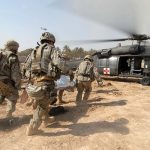Traumatic Brain Injury and Post-Traumatic Stress Disorder: A Causal Link?
Although injury and death define war, every war is unique in its predominant types of injury and causes of death. World War I had chemical warfare, Vietnam was notorious for Agent Orange, and the Iraq and Afghanistan wars have been marked by high rates of traumatic brain injury (TBI).
In the Iraq and Afghanistan arena especially, roadside bombs (improvised explosive devices, IEDs) are a common method of attacking coalition troops. Improved protective gear results in a lower chance of death and a concomitantly greater potential for survivable blast injury. A common result of the sudden changes in pressure caused by powerful blasts is damage to the brain, sometimes with only subtle, or even nonexistent, outward signs of injury.

A correlation between TBI and post-traumatic stress disorder (PTSD) has been noted in a number of recent studies (e.g., 1, 2). Controversy has been raised over misdiagnoses of mild TBI as PTSD – a problem because although their symptoms overlap, their treatments differ. However, TBI is increasingly viewed as a risk factor for later development of PTSD even though disagreement exists over the strength and extent of association. Any possible causality or mechanism have to now been mostly speculative. The problem with associations is that it’s not possible to determine whether one causes the other, whether both are caused by a common factor, or even whether the association is “real” or not. Studies investigating the “direction” of the association (cause and effect) and biological mechanisms are required.
On February 15, a mechanism that may help explain the association between TBI and PTSD was published by a group at UCLA (4). In a rat model of mild TBI, it was observed that the brain is predisposed toward greater “fear learning” following injury. In addition, “injured rats appeared to overgeneralize learned fear to both conditioned and novel stimuli.” The authors analyzed the amygdala – the brain’s critical hub for fear learning – and found that there were “significantly more receptors for excitatory neurotransmitters that promote learning”
What does this mean in the real world? So far, it’s not clear. Humans are not rats, and a laboratory-controlled brain injury is not the same as an IED blowing up your Humvee. So certainly, more studies are needed, but this is a promising step toward understanding causes of PTSD and improving post-trauma care in combat personnel and others.
References
1. Hoge CW, et al. (2008) Mild Traumatic Brain Injury in U.S. Soldiers Returning from Iraq. N Engl J Med 358:453-463. http://www.nejm.org/doi/full/10.1056/NEJMoa072972
2. Schneiderman AI, et al. (2008) Understanding Sequelae of Injury Mechanisms and Mild Traumatic Brain Injury Incurred during the Conflicts in Iraq and Afghanistan: Persistent Postconcussive Symptoms and Posttraumatic Stress Disorder Am J Epidemiol 167: 1446-1452.
3. Kennedy JE, et al. (2007) Posttraumatic stress disorder and posttraumatic stress disorder-like symptoms and mild traumatic brain injury. J Rehab Res Dev 44: 895-920. http://www.rehab.research.va.gov/jour/07/44/7/Kennedy.html
4. Reger ML (2012) Concussive brain injury enhances fear learning and excitatory processes in the amygdala. Biol Psychiatry 71: 335-343. http://www.biologicalpsychiatryjournal.com/article/S0006-3223%2811%2901114-0/abstract
5. Science Daily (February 15, 2012) Traumatic Brain Injury Linked to Post-Traumatic Stress Disorder, Study Suggests. http://www.sciencedaily.com/releases/2012/02/120215143120.htm

Curious, is there differences in the treatment for TBI and PTSD?
Hi, Elizabeth
I’m not an expert in this area, but yes, I’m aware there are differences in treatment, deriving from the fact that TBI is a physical/neurological injury, whereas PTSD is primarily a mental/neurological condition and very complex in origin, expression, and variety of treatment modalities. I can point you to a couple of resources if you’re interested in further reading: the CDC has information on TBI (http://www.cdc.gov/TraumaticBrainInjury/brain_trauma_guidelines.html), the US Dept of Health and Human Services has guidelines for treatment of PTSD (http://www.guidelines.gov/content.aspx?id=5954), and the VA has information on both as they relate to veterans and other members of the armed forces (http://www.ptsd.va.gov/professional/pages/traumatic-brain-injury-ptsd.asp).
Thanks for your comment, and I hope this gets you started.
Maggie
Brilliant! Thank you Maggie!